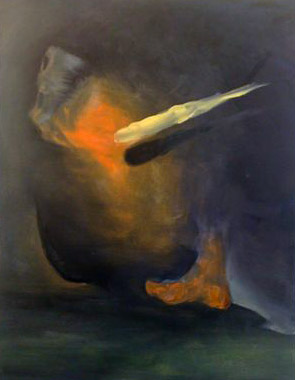War Zone Becomes Art Show In Iraq
It was the al Doura Art Fair, and the sheer ordinariness of the scene was extraordinary.
Just two years ago, the southern Baghdad suburb of al Doura was one of the most violent in Iraq. Here, al Qaeda gunmen went house to house on a dirty mission of ethnic cleansing, evicting and murdering Shi'a residents, and then battled American and Iraqi troops with bombs, bullets and mortars.
For a while, fully a third of the murders in the capital took place in al Doura, while residents cowered at home.
It's hard to believe now on a bright, quiet Sunday afternoon at the al Doura Art Show – grandly called "Safe Life: Prosperity and Culture."
It's been mounted in a makeshift gallery in the local technical college, and is the inspiration – and act of defiance – of artist Farouk Hamdani, who corralled as many local artists as he could find to participate.
"Everybody in Doura said it was impossible after what they've seen…beheadings, killings," he told me. "You know it was so dangerous here, even the schools shut down for more than a year."
Hamdani used to live with his wife and two sons in a different, religiously mixed Baghdad neighborhood. Then one day, Shi'a gunmen showed up and ordered the family out. They went on the run, nomadic refugees in their own city, until at last they found an empty house in Doura.

"There are so few places these days. The cinemas are mostly closed down. Apart from satellite TV, we have no windows to look through anymore to see out - to get a wider glimpse of life."
As we move from one painting to another – landscapes, some 70's-style abstracts, and one cheery naïve scene of women with flower baskets on their head - students from the technical college cluster round, anxious to talk
"We are so glad for this exhibit. We want the world to know that Doura is for civilized people," they insist.
"People from other neighborhoods in Baghdad don't believe our college is working. They still think Dora is a war zone."
In fact, the road leading to the college does still look like – if not a war zone – then the site of some recent natural disaster. Where the drive is not flooded, it's a waste of cracked cement. Four armored Humvees are parked at the front door.
Five years of conflict and neglect have left most of Baghdad in this kind of mess. However, better security is gradually allowing people to pick up the threads of their lives from the wreckage.
At Doura College, knots of young men and women stroll about, neatly and modestly dressed. Down the hall from the art show, a class sits in a sparsely furnished computer lab. A handful of students drink tea on hard chairs in the cafeteria.
Standing by a large gilded plaster sculpture of a 12th Century Iraqi astronomer, Hamdani is talking to Captain Brett Walker of the 4th Infantry Division. He is the U.S. soldier who set up the show.
"Many of the artists showing their work here are people who were kicked out of this neighborhood by insurgents," he said. "When we started this project no one believed it was possible…but we showed them!"
Captain Walker walks over to one of Hamdani's own paintings, hanging on the far wall. On a somber grey canvas, a great foot crushes a mass against the ground. Above, a missile pierces the dark background, revealing garish yellow light.
"I really love this one," says Walker. "This here...that's Saddam's foot, crushing the Iraqi people. And here – this is an American missile tearing a hole in the darkness of the regime to let Iraqi civilization bloom...like a flower, you know?"
It's a fair bet that not everyone in the room would see it quite that way, but these days in Doura, partisan views - like art criticism – no longer invite sudden death.

Farouk Hamdani/CBS

